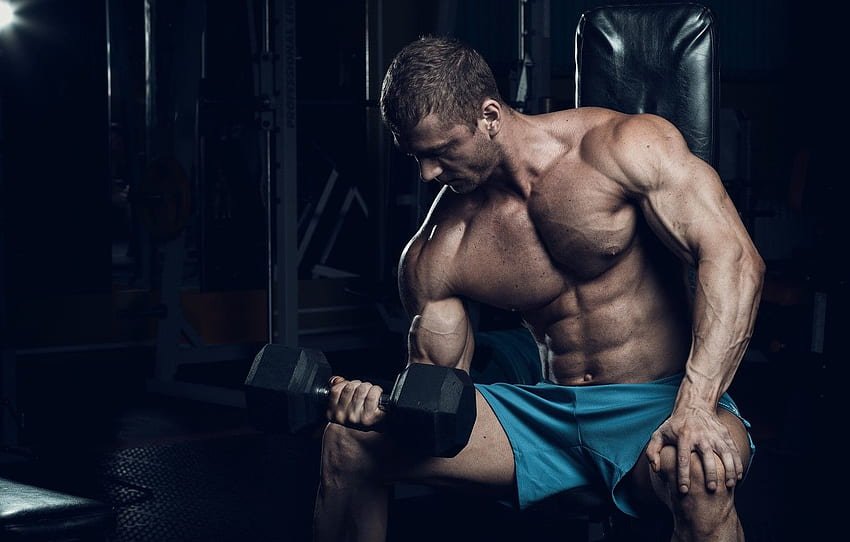Many people who are into fitness and bodybuilding want to achieve strong and fully defined biceps. And very often, they ask themselves, “Will My Biceps Get Bigger if I Train Them Every Day?” During this research, the truth about the muscle growth, the importance of recovery time and the effectiveness of everyday bicep training will be revealed.
The biceps are a visible muscle that gets considerable attention as they are on the facade of the upper arm. Indeed, the significance of the biceps goes beyond a tight t-shirt or a sleeveless top, as some functional fitness followers suggest. The biceps are functionally needed to do pulling tasks and gripping anything heavy.
During resistance training of the biceps, the short head and long head muscles suffer microscopic injury and then development and healing occur during the recovery period. The important factors are training volume, intensity, and recuperation times.

However, bicep exercise frequency should not exceed proper recuperation, while regular training is a must for muscular growth . Overtraining or repeated training of the same muscle area have the potential of impairing muscle repair and loss of gains.
Possession of strong, well-defined biceps brings much more than the obvious advantages of good ones. Despite the satisfaction from the strong arms, the biceps are an integral part of the applied body. As for the practical meaning of the development of strong biceps, this will significantly enhance work in everyday life situations in which one must lift or pull something.
Apart from visually complementing the proportionality of your body, strong biceps also help you physically achieve it. Proper muscle balance in the arms reduces the chance of muscle-related risks, such as injury or joints’ life expectancy. Also, the ability to stand and sit straight becomes increasingly important for people who spend much time sitting in front of a computer screen during the workday.
Do not forget about well-developed and powerful arms, which provide an enormous increase in self-confidence. The sensation of being strong and able-bodied has a profound influence on one’s self-esteem and self-confidence. Muscles do not grow during training but during periods of rest. Overtraining aggravates this condition and disability to recuperate, which leads to muscle breaking, heightened possibility of injury, and stagnation.
Will My Biceps Get Bigger if I Train Them Every Day?
Effective Bicep Training Strategies:

In order to effectively stimulate muscle growth in your biceps, perform various exercises on different angles. Over time, increase the resistance force and workout intensity to continue growth. The other important factor is to enable your muscles to get the nutrients essential for growth and repair. It means that it is vital to eat protein nutrient .
The optimal frequency for working out the biceps depends on the individual. The recommendation of most professionals is to exercise the biceps 2-3 times a week, which allows for adequate rest . Earning bigger biceps necessitates striking a balance between exercising and sleeping. Training every day may appear to be an enticing proposition. Still, one must take into account the practicality of this on a long-term basis after all the downsides and the potential challenges associated with overtraining.
The Drawbacks of Daily Bicep Training:
Increased Risk of Overuse Injuries:
A significant disadvantage of daily training of the same muscle group is a very high risk of overuse injuries. Due to their complex muscular nature, the biceps are especially sensitive to repetitive microtrauma if they are not given enough time to recover . Accordingly, the risk of developing tendonitis , inflammation and small tears in muscle fibers increases.
Diminished Performance and Fatigue:
Daily exercise of the biceps could eventually result in a diminishing performance. The muscles should be given enough time to recuperate so that they can reconstruct without being overworked and weakening since overworking causes fatigue. Muscle fatigue is characterized by reduced sensitivity, which is likely to result in a decline in power, stamina, and general exercise efficiency.
Mental Burnout:
Focusedly working on the same muscle set every single day could be mentally draining. Been there, done that, day in day out working out in a dull manner saps all that energy and enthusiasm, making it difficult to stick with something good and appropriate over the long run. Working on a variety of muscles will not only help you improve your muscles but will also help you stay active in life.
Potential for Overtraining Syndrome:
Overtraining syndrome is characterized by fatigue, diminished performance, pervasive muscular aches, and cramps. While the main cause of overtraining syndrome is increased exertion with insufficient recovery, daily bicep training supplements the general physical strain and may possibly increase the chances of developing this syndrome.
For one to develop larger biceps, it is crucial to strike a balance between routine training and ample recovery time. Daily routines may in the long run have diminishing returns and repercussions. The ideal and growing muscles should be methodical and multilateral and be dependent on a well-designed exercise regimen, proper nutrition, and sufficient sleep.
Frequently Asked Questions (FAQs):
Will My Biceps Get Bigger if I Train Them Every Day?
Consistency is essential for success, but it must be noted that the daily practice might cause overuse injuries and build up fatigue. To ensure that the preparation brings the desired outcomes, it is vital to maintain both regularity and provide time for proper rest.
Can I see noticeable changes in my bicep size with less frequent training?
Muscle growth occurs as a natural phenomenon when the muscle is at rest and recovers. Rest days will be a regular part of your routine and will provide your biceps with the time they need to heal and grow, resulting in gains that will last and be light on Notice.
What signs indicate that I might be overtraining my biceps?
It is also essential to know the Over training symptoms, which include constant muscle soreness, reduced output, and mental lethargy . Be on the lookout for these cues and alter your exercise accordingly.
How important is nutrition in supporting bicep growth?
Muscle growth and recovery after workouts are promoted through the consumption of a well-balanced diet. This is in regard to the recommended dietary fats, carbohydrates, and proteins.





















Pingback: Best Biceps Workout with Dumbbells